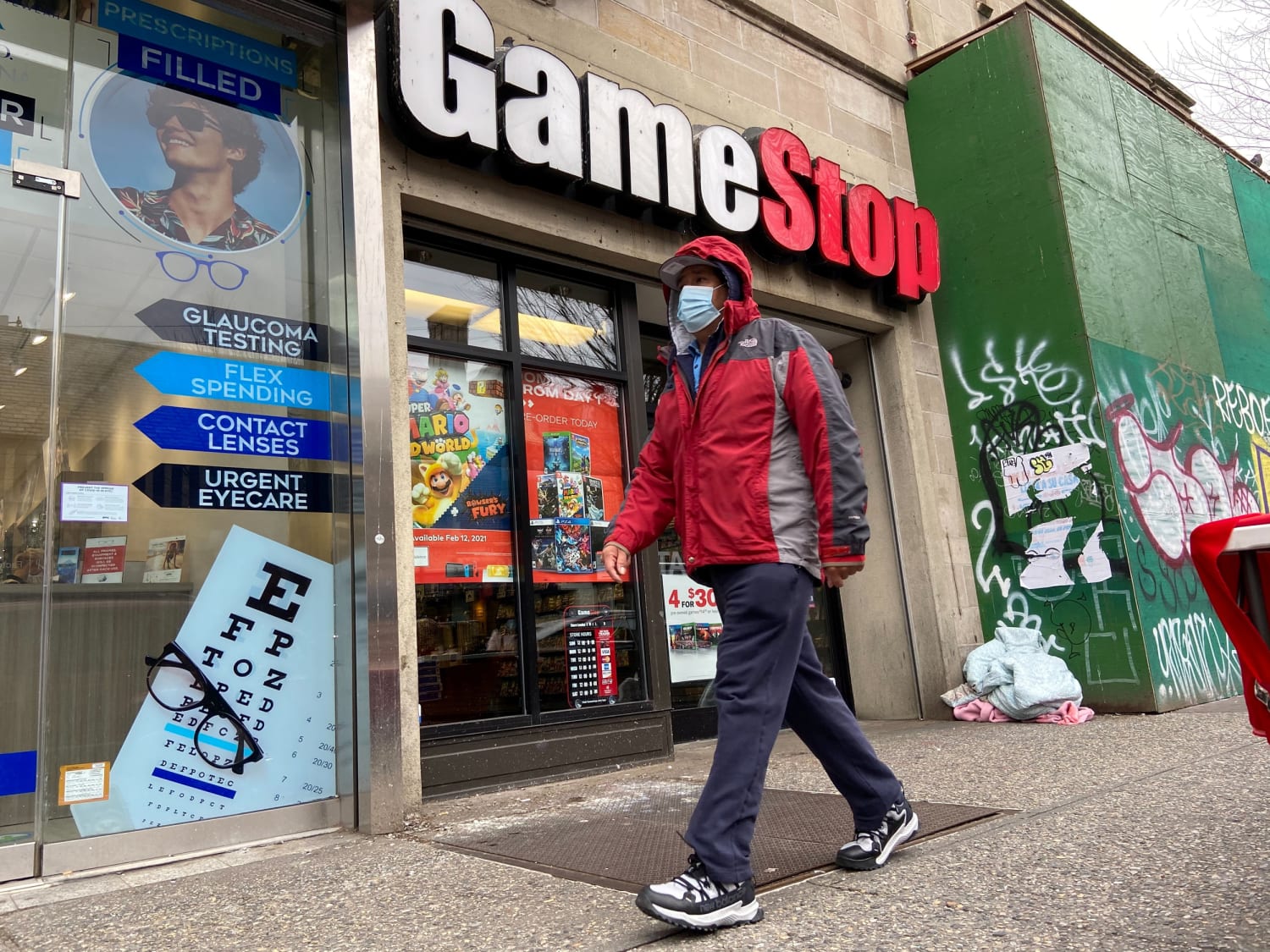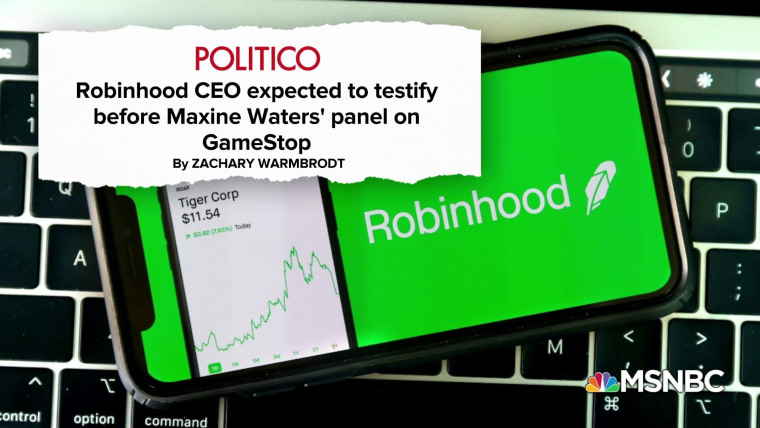WASHINGTON — The online investors who pumped up GameStop and other struggling stocks have become a rare populist cause célèbre that traverses the ideological spectrum, with politicians from Rep. Alexandria Ocasio-Cortez, D-N.Y., to Sen. Ted Cruz, R-Texas, decrying a decision by Robinhood, a popular trading app, to halt investments in certain stocks.
But some veteran Wall Street reformers, who have advocated for laws and regulations to rein in big finance, are uneasy with the rush to cast the story as a simple populist fairy tale of little guys taking on the big players. At best, they see it as premature and at worst as actively dangerous and counterproductive.
“I feel like my role, apparently, is the skunk at the garden party,” said Alexis Goldstein of Americans for Financial Reform, a former Wall Street analyst who became a prominent Occupy Wall Street activist.
On the surface, it’s a story with easy heroes and villains. Small-time investors banded together to raise the price of GameStop, a brand with particular emotional appeal to the young and online, triggering massive losses for some hedge funds that were shorting the stock and, in effect, betting on its decline.
Robinhood’s decision to halt new sales of stocks immediately struck many people as unfair, prompting a wave of conspiracy theories accusing it of protecting big institutional short sellers with ties to the company by giving them time to outmaneuver retail investors. (While Congress is investigating, the likelier explanation is that it lacked the capital to carry out so many trades at once and still meet regulatory requirements.) And nobody wants to be seen on the side of hedge funds, let alone those that made their own risky bets and are now dealing with the consequences.
But there’s still only limited information about which investors — small or big — participated in each step of the trading frenzy, as well as their motives, especially on anonymous message boards like Reddit’s r/WallStreetBets. The potential for “Wolf of Wall Street”-style schemes to hype stocks and then sell, which became a smaller-scale problem on early AOL finance message boards 20 years ago, is obvious.
Safeguarding consumers from risky financial products and speculative bubbles has been a core cause for the post-2008 left. The politician most associated with the movement, Sen. Elizabeth Warren, D-Mass., has been notably reluctant to claim the Reddit investors as allies.
“I am deeply concerned that these casino-like swings in the value of GameStop and other company shares are yet another example of the gamesmanship that interferes with the ‘fair, orderly, and efficient’ function of the market,” Warren wrote in a letter to the Securities and Exchange Commission demanding an investigation into whether message board participants violated securities laws, along with the hedge funds they were targeting.
She expressed fear that bad actors could game message boards to manipulate markets, noting a “troubling lack of clarity regarding who the major market participants are in this case and the degree to which their activities may be coordinated.”
The lines between small investors, wealthy individual investors and big Wall Street players are also blurry. It’s not clear who bet for or against GameStop at what point and who is capturing the lion’s share of profits and taking the biggest losses. While some hedge funds took hits, others reaped huge profits. The private equity firm Silver Lake, which owned a large stake in Reddit favorite AMC Entertainment Holdings, took the opportunity to cash out.
“There are rich people on both sides of this,” Warren said on CNBC.
Goldstein predicted that the massive volume of trades this week would be a boon to Wall Street firms, both in fees on transactions and in use of advanced software to make rapid trades that tend to profit from volatility.
Congress and regulators are only beginning to investigate the varying roles hedge funds, Robinhood and online investors played and whether any broke the rules, which can make it hard to determine which issues, if any, should rise to policymakers’ attention.
“After cases where there’s various flash crises or potential market manipulation, there are always all these competing theories batted around,” said Graham Steele, director of the Corporations and Society Initiative at Stanford Graduate School of Business. “But only people who can subpoena info and get the underlying data can get to the bottom of the real problem.”
Before this month, it was hard to find voices on the left arguing that the answer to a supposedly rigged economy is to encourage millions of Americans to rush into amateur day trading, in which the vast majority of investors lose money against the market.
While some, like Rep. Ro Khanna, D-Calif., have hailed technology’s ability to “democratize access to American financial institutions,” many others worry that politicians could put ordinary Americans’ finances in danger by valorizing risky investments and playing into messaging that portrays buying stock as an act of defiance.
“Do I think this is a good way to disrupt the concentration of power in the economic system? I do not,” Goldstein said. “I’m worried the media attention is going to push more people into this at what may be the top, which is exactly what happened in the dotcom bubble.”
In general, the anti-Wall Street left has been extremely skeptical of equity trading. The more typical talking points are that the stock market isn’t the real economy and that, as constituted, real-time investments inevitably give large institutional players advantages over the little guy. It isn’t clear how working Americans, many of whom have little savings and no investments, benefit from this week’s chaos.
The subreddit associated with the GameStop frenzy and its get-rich-quick ethos also has an obvious attraction for problem gamblers, while the board culture can promote options trades that are especially risky. Critics have expressed similar fear about Robinhood’s interface and marketing.
Download the NBC News app for breaking news and politics
Supporters of the r/WallStreetBets forum have pointed to popular posts from users claiming that they deliberately plan to lose money on their GameStop purchases and hold to the bottom to send some kind of message to Wall Street that investors are going in clear-eyed.
But there’s no telling who’s writing the posts, and talk of a higher cause should be a red flag to anyone who would otherwise be wary of Internet boards with insular cultures and anonymous leaders who egg one another on to potentially harmful behavior with memes and in-jokes.
The skepticism goes double when the behavior has monetary value to others. It’s easy to see how unscrupulous actors could persuade small investors to hold an overvalued stock on vague ideological grounds, sell their own shares at the top and then leave a combination of radicalized users and inexperienced traders to take the loss, enticed by folk stories about overnight GameStop millionaires.
Even as some criticize the simplistic framing of the story, Wall Street reformers say the GameStop phenomenon touches upon an array of policy issues. Some are broad, like the dominant position of financial institutions in the economy and how it affects inequality.
Goldstein, among others, has argued for a financial transaction tax to fund benefits that might improve the economic prospects of people outside the stock market. Other suggestions are more niche, like possibly limiting certain kinds of short sales or determining the proper capital requirements and regulations for trading platforms like Robinhood.
But one thing is certain: Unlike the big Wall Street players they’re railing against, who can create systemic issues if they fail, none of the politicians celebrating the traders for a news cycle will consider bailing those small investors out if they lose everything.
Source: | This article originally belongs to Nbcnews.com











